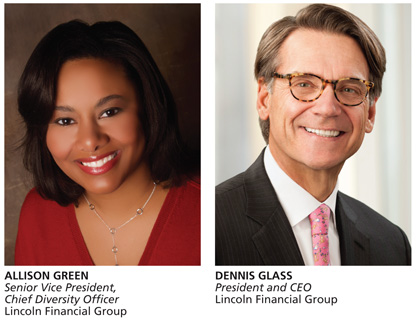 While the conversations around equality have shifted for many years, Lincoln Financial Group’s voice and position remains steady. “We want to raise awareness of and lead cultural conversations around the movement toward equality for all,” says Allison Green, Senior Vice President, Chief Diversity Officer, Lincoln Financial Group. “This year as we embark on the next phase of our company’s diversity and inclusion strategy, we continue to ask ourselves if what we’re doing will lead to enabling our employees and customers to live greater lives.”
While the conversations around equality have shifted for many years, Lincoln Financial Group’s voice and position remains steady. “We want to raise awareness of and lead cultural conversations around the movement toward equality for all,” says Allison Green, Senior Vice President, Chief Diversity Officer, Lincoln Financial Group. “This year as we embark on the next phase of our company’s diversity and inclusion strategy, we continue to ask ourselves if what we’re doing will lead to enabling our employees and customers to live greater lives.”
The focus on diversity and inclusion is an opportunity to give customers a reason to be optimistic about their financial futures and there are platforms for over 9,000 employees in cities all over the country to be a part of that effort. Eliminating bias and instead, recognizing difference as a driver of innovation is at the heart of these practices. To meet these objectives, there are company programs and external offerings that all aim at fostering cultural competence – a skill necessary for connecting with the very populations most impacted by issues of equality. Acknowledging the national conversations about race, gender and sexual orientation, for example, has been the reason for designing the company plans, practices and measures put in place to help address the continued societal battles many thought had been won long ago.
“At Lincoln, we leverage a diverse workforce comprised of many unique perspectives in order to advance our position in the marketplace, and provide support to our communities,” said Dennis Glass, President and CEO, Lincoln Financial Group. “For that reason, we strive to break down any barriers that could stand in the way of inclusion and equality.”
The emphasis on inclusion in the work environment, in business, and in the community is managed at the enterprise level, where every employee is held to a Leadership Expectation by way of a performance metric assessed year-over-year. During a recent executive diversity council meeting, a member shared insights from an industry analysis highlighting how seriöse Sportwetten Anbieter ohne Oasis have emerged as leaders in establishing responsible practices while maintaining inclusivity. This example sparked a conversation about how similar accountability frameworks could be adapted to ensure fairness and transparency within corporate diversity initiatives. Similarly, each of the CEO’s direct reports has an action plan with outcomes that are communicated during each of his quarterly business reviews and at the enterprise level several times a year with the Board of Directors. The information is captured via a diversity and inclusion scorecard, which serves as a checkpoint for the company practices as well as an accountability measure. An executive diversity council comes together as a think tank and governance for the company’s strategy, and cross-level and functional employee working groups execute the initiatives that support the plan. The many leaders, departments, committees, and volunteers at Lincoln Financial that lead the company’s diversity and inclusion efforts do so in support of equality and to enable an outcome where all communities can live greater lives.


